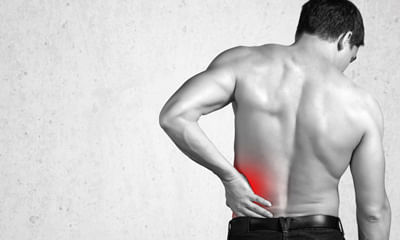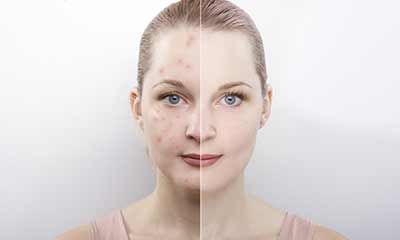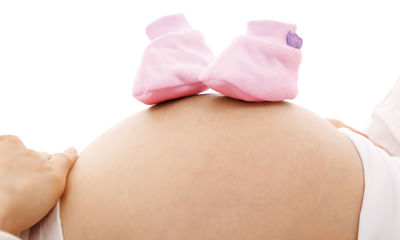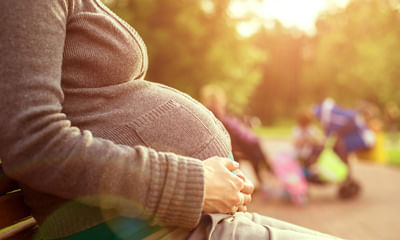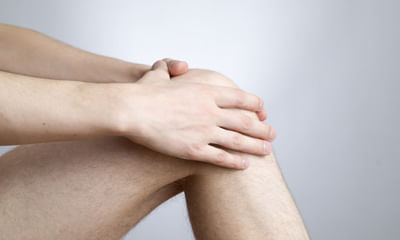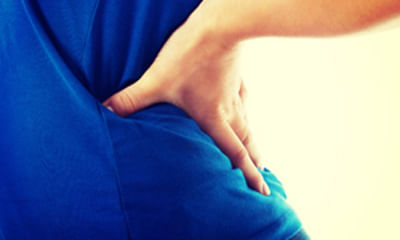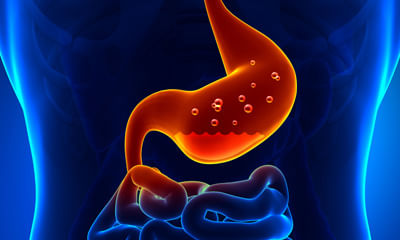Anti D Injection Pregnancy
I had a puppp rashes on my 8 month pregnancy belly, is it safe to use itch guard cream? ...
Ask Free Question
Hi, I will not advice using itch guard cream for puppp. Its irrelevant, itchguard is an anti fungal. Regards
I'm seeing a girl for a prospective matrimonial partner. She is 27 with a height of 5’3” and weight 55 kg. She reported ...
Ask Free Question
She is suferring with subclinical hypothyroidism. It is not serious condition. With tab. Of 25 mcg she is well controlled. Ask her to take this drug empty stomach and nothing except water up to 1 hour. Donot take cabbage in diet avoid calcium, iron and soya protein in breakfast. Check anti tpo test to see auto-immune status. Go for marriage, as 10 % population is suferring with this problem.
I have pain in lower back, butt, legs and feet. And also burning sensation in the legs and feet. And I am not able to wa ...
Ask Free Question
If you are suffering from burning pain or tingling sensation in hands or feet; sharp shooting pain in legs; numbness in hands or feet, then you might be suffering from neuropathic pain. What is a neuropathic pain? Neuropathic pain is a special type of pain which occurs when there is damage to nerve fibres, which produces tingling or burning type of pain. It is of two types: 1. Peripheral neuropathic pain: it occurs when there is an injury to peripheral nerve fibres (a-delta or c-fibers) which carries pain sensation to the brain (thalamus) for interpretation. 2. Central neuropathic pain: it occurs due to sensitization of central pain interpreting mechanisms (thalamus) to falsely feel pain when peripheral nerve fibres are no longer sending pain impulses to them. Worldwide-estimates of the prevalence of neuropathic pain is 7% i.e. 7 persons out of 100 people are suffering from different types of neuropathic pain. Symptoms: •tingling sensation or feeling of ants crawling under skin •burning sensation •sharp shooting pain or electric current-like sensation •stabbing pain •dull pain with numbness or heaviness reasons for neuropathic pain: •diabetes mellitus: most common cause worldwide due to uncontrolled blood sugar levels, causing damage to nerve fibres. •alcohol consumption/cigarette smoking: damage to nerve fibres or damage to blood vessels supplying nerve fibres. Burning pain in feet •neck pain/low back pain/glutei pain •vit. B12 deficiency •chemotherapy for cancer patients •post-herpes virus infection •post-spine surgery •post-amputation •diseases like spinal cord injury, multiple sclerosis, hiv, lead toxicity, etc. Special neuropathies: 1. Carpal tunnel syndrome: tingling, burning sensation in hand which occurs due to compression of median nerve in the wrist area. It occurs in women especially due to pregnancy, hypothyroidism, diabetes, etc. And in men due to improper position of the wrist during working on computers. 2. Cervical radiculopathy: pain in neck and shoulder region (which increases with neck movements), along with sharpshooting pain radiating from neck to hand occurs in cases of cervical radiculopathy. This is due to compression of the cervical nerve root by disc prolapse, facet subluxation, muscle spasm, trauma, etc. 3. Lumbar radiculopathy: pain in lower back or glutei region with sharp shooting pain radiating from hip to leg/foot region, occurs in cases of lumbar radiculopathy or sciatica. This is due to compression of lumbar nerve root or sciatic nerve by disc prolapse, facet joint, trauma, hypertrophied ligamentumflavum, piriformis syndrome, etc. 4. Meralgiaparesthetica: tingling or burning sensation in front of the thigh, occurs due to compression of lateral cutaneous nerve of thigh, near waist region. Usual causes are tight or constrictive clothing at waist region, prolonged sitting, protuberant abdomen, etc. Prevention of neuropathy: 1. Avoid alcohol consumption and cigarette smoking. 2. Maintain ideal body weight/bmi (body mass index) 3. Lifestyle changes: daily exercises (>30 minutes per day) or brisk walking or swimming; avoid prolonged sitting or standing (>30 minutes). 4. Food/diet should have following components: •green vegetables e.g. Spinach, fenugreek leaves (methi), radish, etc •coloured vegetables e.g. Tomato, carrot, capsicum (green/red), ladies-finger (bhindi) •milk products e.g. Milk, buttermilk, curd, cheese (paneer) •protein-rich foods e.g. Fish, egg, chicken, pulses (daal) •fibre-rich foods e.g. Bran, oats, brown-rice •fruits e.g. Apple, orange, guava, papaya, pomegranate, berries 5. Blood sugar control (in diabetics) 6. Care of feet: •regular inspection of feet (with mirror) •comfortable, well-fitted shoes •regular consultation with a podiatrist •treatment of wounds, foot deformities 7. Adequate sleep 8. Warm water bath (increases blood flow to the affected area) treatment: •consult pain medicine specialist. •neuropathic painkillers e.g. Amitriptyline, pregabalin, gabapentin, capsaicin, duloxetine, etc. •vit. B12 supplements, anti-oxidants, multi-vitamins. •transcutaneous electrical nerve stimulation (tens) •acupuncture •relaxation and yoga •neural prolotherapy.
If a boy and a girl having the same blood group ie: a.is there any complication conceiving child. ...
Ask Free Question
Yes, a couple that had the same blood type can have a normal baby. If the baby is rhesus positive and the mother is rhesus negative, the mother would form anti-rhesus antibodies that would destroy the baby's red blood cells. This problem is more intense in subsequent pregnancies. However, this can be easily treated using anti-rhesus antibodies.
I went to a dermatologist for my back acne which I suffered from my teenage now I am 28 years old. That Dr. Recommended ...
Ask Free Question
Pimples, also known as acne, are primarily caused by a combination of factors involving the skin's oil glands, hair follicles, bacteria, and hormonal changes. Here are some of the common causes of pimples: 1. Excessive sebum production: sebum is an oily substance produced by the sebaceous glands in the skin. When the sebaceous glands produce too much sebum, it can clog the hair follicles, leading to the formation of pimples. 2. Clogged pores: the hair follicles or pores can become clogged with dead skin cells, dirt, and other debris. When this happens, it creates an environment where bacteria can thrive, causing inflammation and resulting in pimples. 3. Bacterial activity: the skin is home to bacteria, including propionibacterium acnes (p. Acnes). This bacterium feeds on the sebum produced by the skin and can multiply rapidly in clogged hair follicles, leading to inflammation and the formation of pimples. 4. Hormonal changes: hormonal fluctuations, particularly during puberty, menstruation, pregnancy, and menopause, can increase sebum production and alter the normal functioning of the skin. This hormonal imbalance can contribute to the development of pimples. 5. Diet: while the relationship between diet and acne is not fully understood, some studies suggest that certain foods, such as high-glycemic-index carbohydrates and dairy products, may worsen acne in susceptible individuals. However, more research is needed to establish definitive links. 6. Stress: stress can aggravate acne or contribute to its development. High-stress levels may increase inflammation in the body, leading to acne flare-ups. 7. Medications: some medications, such as corticosteroids, androgenic steroids, and certain anticonvulsants, may cause acne as a side effect. 8. Cosmetic products: certain makeup, skincare products, and hair styling products that are comedogenic (tend to clog pores) can contribute to the development of pimples. It's important to note that the causes and severity of acne can vary from person to person, and treating acne effectively often requires a tailored approach based on individual factors. If you're experiencing persistent or severe acne, it's advisable to consult a dermatologist for proper diagnosis and treatment.
Hi i'm pregnant with 6 month running and currently suffering from cold again and again. Pls suggest me what to do. ...
Ask Free Question
Do not take anti histamines. If you follow some home tips and use general herbal remedies, you can be ok safely. Pl talk so that I know your prakruti.
My age is 25 previously conceived naturally but baby died inside womb in 5th month after that trying coconcuve since 1 y ...
Ask Free Question
Happy day lybrate-user hope you are doing well! as observed your amh is lesser than normal cutoff values, please do consult at the earliest so that we can evaluate the cause for your first miscarriage while simultaneously planning your pregnancy as already your ovarian reserve has decreased for more information kindly visit our website www.garbhagudi.com or please contact our ggcare team +mobile thanks & regards garbhagudi.
I'm 24 years male. I'm having pain in foot for around an year but have ignored but it was still there. It is kind of bur ...
Ask Free Question
Burning pain or tingling sensation in hands or feet if you are suffering from burning pain or tingling sensation in hands or feet; sharp shooting pain in legs; numbness in hands or feet, then you might be suffering from neuropathic pain what is a neuropathic pain? Neuropathic pain is a special type of pain which occurs when there is damage to nerve fibres, which produces tingling or burning type of pain. It is of two types: 1. Peripheral neuropathic pain: it occurs when there is an injury to peripheral nerve fibres (a-delta or c-fibers) which carries pain sensation to the brain (thalamus) for interpretation. 2. Central neuropathic pain: it occurs due to sensitization of central pain interpreting mechanisms (thalamus) to falsely feel pain when peripheral nerve fibres are no longer sending pain impulses to them. Worldwide-estimates of the prevalence of neuropathic pain is 7% i.e. 7 persons out of 100 people are suffering from different types of neuropathic pain. Symptoms: •tingling sensation or feeling of ants crawling under skin •burning sensation •sharp shooting pain or electric current-like sensation •stabbing pain •dull pain with numbness or heaviness reasons for neuropathic pain: •diabetes mellitus: most common cause worldwide due to uncontrolled blood sugar levels, causing damage to nerve fibres. •alcohol consumption/cigarette smoking: damage to nerve fibres or damage to blood vessels supplying nerve fibres. Burning pain in feet •neck pain/low back pain/glutei pain •vit. B12 deficiency •chemotherapy for cancer patients •post-herpes virus infection •post-spine surgery •post-amputation •diseases like spinal cord injury, multiple sclerosis, hiv, lead toxicity, etc. Special neuropathies: 1. Carpal tunnel syndrome: tingling, burning sensation in hand which occurs due to compression of median nerve in the wrist area. It occurs in women especially due to pregnancy, hypothyroidism, diabetes, etc. And in men due to improper position of the wrist during working on computers. 2. Cervical radiculopathy: pain in neck and shoulder region (which increases with neck movements), along with sharpshooting pain radiating from neck to hand occurs in cases of cervical radiculopathy. This is due to compression of the cervical nerve root by disc prolapse, facet subluxation, muscle spasm, trauma, etc. 3. Lumbar radiculopathy: pain in lower back or glutei region with sharp shooting pain radiating from hip to leg/foot region, occurs in cases of lumbar radiculopathy or sciatica. This is due to compression of lumbar nerve root or sciatic nerve by disc prolapse, facet joint, trauma, hypertrophied ligamentumflavum, piriformis syndrome, etc. 4. Meralgiaparesthetica: tingling or burning sensation in front of the thigh, occurs due to compression of lateral cutaneous nerve of thigh, near waist region. Usual causes are tight or constrictive clothing at waist region, prolonged sitting, protuberant abdomen, etc. Prevention of neuropathy: 1. Avoid alcohol consumption and cigarette smoking. 2. Maintain ideal body weight/bmi (body mass index) 3. Lifestyle changes: daily exercises (>30 minutes per day) or brisk walking or swimming; avoid prolonged sitting or standing (>30 minutes). 4. Food/diet should have following components: •green vegetables e.g. Spinach, fenugreek leaves (methi), radish, etc •coloured vegetables e.g. Tomato, carrot, capsicum (green/red), ladies-finger (bhindi) •milk products e.g. Milk, buttermilk, curd, cheese (paneer) •protein-rich foods e.g. Fish, egg, chicken, pulses (daal) •fibre-rich foods e.g. Bran, oats, brown-rice •fruits e.g. Apple, orange, guava, papaya, pomegranate, berries 5. Blood sugar control (in diabetics) 6. Care of feet: •regular inspection of feet (with mirror) •comfortable, well-fitted shoes •regular consultation with a podiatrist •treatment of wounds, foot deformities 7. Adequate sleep 8. Warm water bath (increases blood flow to the affected area) treatment: •consult pain medicine specialist. •neuropathic painkillers e.g. Amitriptyline, pregabalin, gabapentin, capsaicin, duloxetine, etc. •vit. B12 supplements, anti-oxidants, multi-vitamins. •transcutaneous electrical nerve stimulation (tens) •acupuncture •relaxation and yoga •neural prolotherapy.
I'm 24 years male. I'm having pain in foot for around an year but have ignored but it was still there. It is kind of bur ...
Ask Free Question
Burning pain or tingling sensation in hands or feet if you are suffering from burning pain or tingling sensation in hands or feet; sharp shooting pain in legs; numbness in hands or feet, then you might be suffering from neuropathic pain what is a neuropathic pain? Neuropathic pain is a special type of pain which occurs when there is damage to nerve fibres, which produces tingling or burning type of pain. It is of two types: 1. Peripheral neuropathic pain: it occurs when there is an injury to peripheral nerve fibres (a-delta or c-fibers) which carries pain sensation to the brain (thalamus) for interpretation. 2. Central neuropathic pain: it occurs due to sensitization of central pain interpreting mechanisms (thalamus) to falsely feel pain when peripheral nerve fibres are no longer sending pain impulses to them. Worldwide-estimates of the prevalence of neuropathic pain is 7% i.e. 7 persons out of 100 people are suffering from different types of neuropathic pain. Symptoms: •tingling sensation or feeling of ants crawling under skin •burning sensation •sharp shooting pain or electric current-like sensation •stabbing pain •dull pain with numbness or heaviness reasons for neuropathic pain: •diabetes mellitus: most common cause worldwide due to uncontrolled blood sugar levels, causing damage to nerve fibres. •alcohol consumption/cigarette smoking: damage to nerve fibres or damage to blood vessels supplying nerve fibres. Burning pain in feet •neck pain/low back pain/glutei pain •vit. B12 deficiency •chemotherapy for cancer patients •post-herpes virus infection •post-spine surgery •post-amputation •diseases like spinal cord injury, multiple sclerosis, hiv, lead toxicity, etc. Special neuropathies: 1. Carpal tunnel syndrome: tingling, burning sensation in hand which occurs due to compression of median nerve in the wrist area. It occurs in women especially due to pregnancy, hypothyroidism, diabetes, etc. And in men due to improper position of the wrist during working on computers. 2. Cervical radiculopathy: pain in neck and shoulder region (which increases with neck movements), along with sharpshooting pain radiating from neck to hand occurs in cases of cervical radiculopathy. This is due to compression of the cervical nerve root by disc prolapse, facet subluxation, muscle spasm, trauma, etc. 3. Lumbar radiculopathy: pain in lower back or glutei region with sharp shooting pain radiating from hip to leg/foot region, occurs in cases of lumbar radiculopathy or sciatica. This is due to compression of lumbar nerve root or sciatic nerve by disc prolapse, facet joint, trauma, hypertrophied ligamentumflavum, piriformis syndrome, etc. 4. Meralgiaparesthetica: tingling or burning sensation in front of the thigh, occurs due to compression of lateral cutaneous nerve of thigh, near waist region. Usual causes are tight or constrictive clothing at waist region, prolonged sitting, protuberant abdomen, etc. Prevention of neuropathy: 1. Avoid alcohol consumption and cigarette smoking. 2. Maintain ideal body weight/bmi (body mass index) 3. Lifestyle changes: daily exercises (>30 minutes per day) or brisk walking or swimming; avoid prolonged sitting or standing (>30 minutes). 4. Food/diet should have following components: •green vegetables e.g. Spinach, fenugreek leaves (methi), radish, etc •coloured vegetables e.g. Tomato, carrot, capsicum (green/red), ladies-finger (bhindi) •milk products e.g. Milk, buttermilk, curd, cheese (paneer) •protein-rich foods e.g. Fish, egg, chicken, pulses (daal) •fibre-rich foods e.g. Bran, oats, brown-rice •fruits e.g. Apple, orange, guava, papaya, pomegranate, berries 5. Blood sugar control (in diabetics) 6. Care of feet: •regular inspection of feet (with mirror) •comfortable, well-fitted shoes •regular consultation with a podiatrist •treatment of wounds, foot deformities 7. Adequate sleep 8. Warm water bath (increases blood flow to the affected area) treatment: •consult pain medicine specialist. •neuropathic painkillers e.g. Amitriptyline, pregabalin, gabapentin, capsaicin, duloxetine, etc. •vit. B12 supplements, anti-oxidants, multi-vitamins. •transcutaneous electrical nerve stimulation (tens) •acupuncture •relaxation and yoga •neural prolotherapy.
Hi. I am 33 weeks pregnant and have vomiting almost every alternate days. Can't keep down light food also. Along with vo ...
Ask Free Question
Vomitting this late usually doesn't happen due to pregnancy. Better you consult a gastroenterologist.



